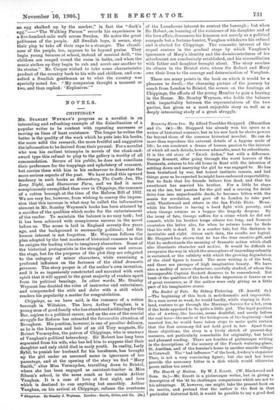NOVELS.
CHIPFINGE.* ME. STANLEY WEYMAN'S progress as a novelist is an interesting and refreshing example of the disinclination of a popular writer to be content with repeating successes or moving on lines of least resistance. The longer he writes the better is the quality of the work which he puts into his books, the more solid the research, the more fruitful and suggestive the information to be derived from their perusal. For a novelist who won his earliest triumphs in novels of the cloak-and- sword type this refusal to play to the gallery is worthy of all commendation. Secure of his public, he does not conciliate their preference for the trappings and upholstery of romance, but carries them with him in his endeavour to dramatise the more serious aspects of the past. We have noted this upward tendency in such books as Shrewsbury, The Castle Inn, The Long Night, and Starvecrow Farm, and we find it more conspicuously exemplified than ever in Chippinge, the romance of a rotten borough at the time of the Reform Bill of 1832. We are very far, however, from wishing to convey the impres- sion that this increase in what may be called the informative element in Mr. Stanley Weyman's books has been attained by a sacrifice of the qualities which make for the entertainment of the reader. To maintain the balance is no easy task ; but it has been achieved with conspicuous success in the novel before us. The scene is laid in England seventy-five years ago, and the background is necessarily political ; but the human interest is not forgotten. Mr. Weyman follows the plan adopted by the best masters of historical romance in that he assigns the leading roles to imaginary characters. Some of the historical protagonists in the struggle cross and recross the stage, but for the purposes of the plot they are relegated to the category of minor characters, while exercising a profound influence on the fortunes of the chief dramatis personae. The story proper is of the author's own invention, and it is so ingeniously constructed and narrated with such spirit that it will appeal to the great majority of readers apart from its political bearings. In other words, Mr. Stanley Weyman has doubled the roles of instructor and entertainer, and compounded the utile and duke with a skill which renders his popularity a matter for congratulation.
Chippinge, as we have said, is the romance of a rotten - borough in Wiltshire. The hero, Arthur Vaughan, is a young man of good family who has abandoned soldiering for the Bar, aspires to a political career, and on the eve of the crucial struggle for Reform has attracted the favourable attention of Brougham. His position, however, is one of peculiar delicacy, as he is the kinsman and heir of an old Tory magnate, Sir Robert Vermuyden, the patron of Chippinge, who is unaware of Vaughan's political heterodoxy. Sir Robert has long been separated from his wife, who has led him to suppose that their - daughter and only child died in early youth. In reality, Lady Sybil, to punish her husband for his harshness, has brought tip the girl under an assumed name in ignorance of her parentage, and at the opening of the story We find "Mary Smith," alias Miss Vermuyden, travelling down to Bristol, where she has been engaged as assistant-teacher in Miss Sibson's school, in the same coach as her cousin Arthur Vaughan. It is a case of love at first sight, and love -which is destined to run anything but smoothly. Arthur Vaughan, on his arrival at Chippinge, refuses the overtures
• Chippinge. By Stanley J. Weyman. London : Smith, Elder, and Co. [6a.]
of the Lansdowne interest to contest the borough ; but when Sir Robert, on learning of the existence of his daughter and of the love affair, denounces his kinsman not merely as a political renegade but a fortune-bunter, Vaughan withdraws his refusal and is elected for Chippinge. The romantic interest of the sequel centres in the gradual steps by which Vaughan's ignorance of Mary's identity and the disinterestedness of his attachment are conclusively established, and his reconciliation with father and daughter brought about. The story reaches its climax in the Bristol riots, where Sir Robert and Mary owe their lives to the courage and determination of Vaughan.
There are many points in the book on which it would be a pleasure to dwell,—the charming picture of the journey by coach from London to Bristol, the scenes on the hustings at Chippinge, the efforts of the young Member to gain a hearing in the House. Mr. Stanley Weyman, who holds the balance with impartiality between the representatives of the two parties, has given us a most enjoyable story as well as a deeply interesting study of a great struggle.














































 Previous page
Previous page